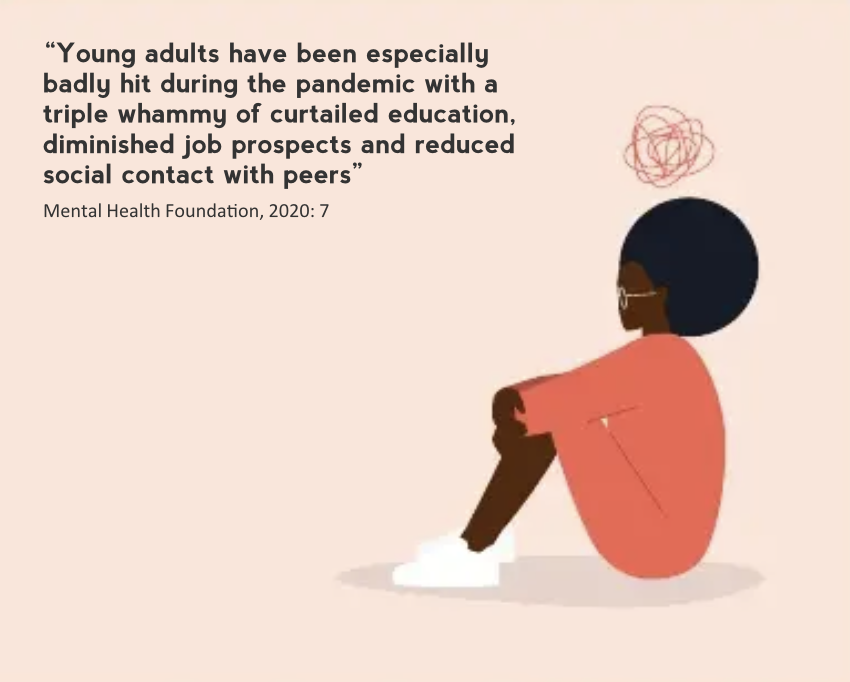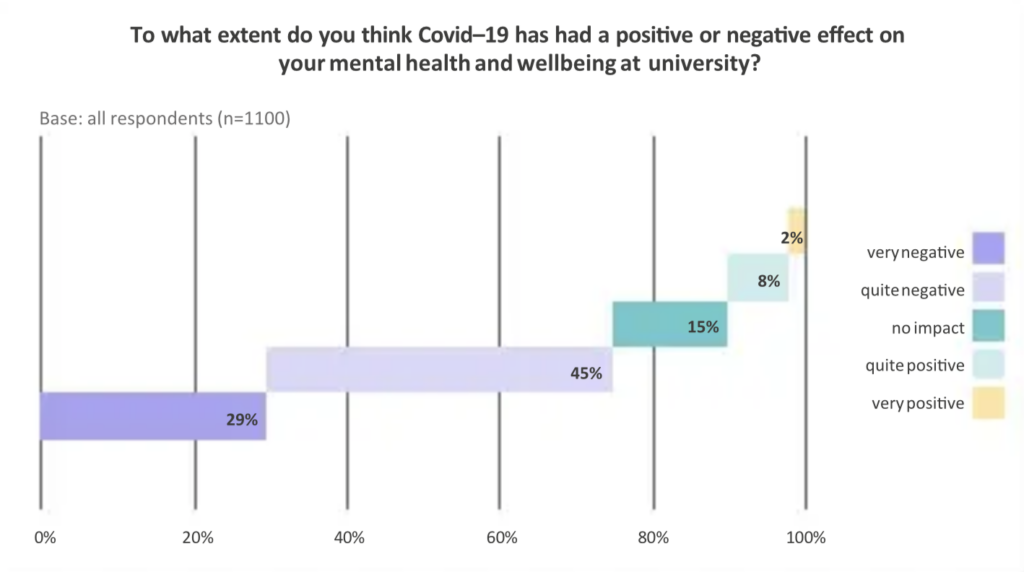UCAS predicts about 70,000 students that enter Higher Education each year have an existing mental health condition that they don’t declare due to stigma. Now, imagine all the current students who are suffering the effects of Covid-19 on their studies.

Students have experienced significant disruption and uncertainty as universities have had to adapt to remote learning environments. These challenges, coupled with the inherent stress and uncertainty of a global pandemic, have impacted the mental health and wellbeing of students at university.
While starting can be fun and exciting, a new adventure in your life, university is a major life transition that can be overwhelming to manage academic and social pressures. If you’re reading this, you’ve most probably been to university and graduated or you’re currently studying and trying to manage student life in a pandemic. Don’t worry, we’ve been there and done that, so we know exactly how you feel.
Students more so now than ever, feel the pressures in the job market as it becomes more competitive. Before the pandemic, it was hard enough, but recruitment teams weren’t overloaded with applications as much as they are now. The Coronavirus pandemic has massively intensified these factors for students as there has been a lack of support to guide students through how they can help themselves through the pandemic with the stress of deadlines, job searching and feeling isolated from family and friends.

National Union of Students (NUS) carried out a survey in 2020 that showed 52% of students say their mental health deteriorated or was affected by Covid-19. Only 29% of those whom have reported mental health struggles are seeking help from services available to them. Funding is the main factor for students not seeking help. It’s no secret there’s a lack of funding from the government to support students and only students’ voices can help put pressure on the people at the top of the institution to make changes alongside the government. So if you feel like you’re not getting the support you need from university, raise your concerns. Student Unions aren’t funded by governments or universities, they’re students themselves who set up a union to support students, so they may be the best people to speak to. Nearly 30% of adults and 34% of young people said their mental health got much worse during the pandemic.
Student Minds also carried out a survey in 2020/2021 that showed 74% of students had reported that Covid-19 has had a negative impact on their mental health and wellbeing at university and 82% of respondents say the Covid-19 pandemic has negatively impacted their academic experience. During the first lockdown in March 2020, research by Mind carried out in 2020, found that 60% of adults reported a worsening in their mental health. The figure increased to 68% of young people and 73% of university students. In June 2021, the figure decreased to 50%, in line with restrictions easing. You most probably feel like, since the easing of restrictions, your mental health has somewhat improved because you can now do what you want!
It’s important to remember that you’re not alone when it comes to struggling mentally, it can happen to anyone at any stage of their life. Academic stress is most probably the main thing on your mind at the moment and I’ve spoken to a few students who feel the same way you do. They’d like to keep their name anonymous as they’re current students. They spoke to me about their experience with studying during a pandemic and the effects it’s had on their mental health as well as the services available internal and external to the university.
- Do you feel like your university has supported you in your studies during the pandemic?
Student 1 – No, my university left me in the deep end. I have suffered through so much mentally that when I graduate, I will be a completely different person to the person before I started. I suffer from social anxiety, and now when I hear the notification ring from my university email I tense up. They’ve added on more stress than they have helped me through the pandemic.
Student 2 – No, I don’t think the university has supported me at all. I’ve felt extremely lost at times and even though there is well-being support from the university side available, It feels uncomfortable and impersonal to reach out via email writing down all your fears as ultimately that support cannot really help with the pressure of completing university work or sticking to deadlines. Also, there was little support in the sense of the actual teaching process. There should have been more consideration for us students in terms of marking and workload since we basically only had some videos and teach ourselves on our own in a way.
Student 3 – Yes! We have access to mental health support programs and self-help guides through intranet, and at request of the student, one to one sessions with tutors to discuss options available for different modules. They’ve been so helpful and supportive, it’s made doing my work a lot easier. - Are you aware of the mental health services available to you?
Student 1 – I know that the NHS provides lines for mental health issues but any other outside sources I don’t know much about. I see a lot of discussions between people, but nobody highlights where you can go for help. The university itself says they have a department that offers support with mental health it its barely advertised to us.
Student 2 – I believe so. I know of the well-being service at university and have reached out to them before, but I found the whole process of it quite complicated.
Student 3 – Not necessarily but all the information related to these services were only a few clicks away. Module leaders also tried to make sure all students knew of services available to them. - How did you deal with it during the pandemic compared to now that we’re ‘living with Covid’ under the new UK guidelines?
Student 1 – During the pandemic the best way for me to relieve my anxiety was through baking and gaming. Any recipe: from cookies, brownies, loaf cakes, I made it. It just took my mind away from the stresses I was dealing with at the time. Gaming allowed me to just shut everything out and it was a way for me to vent, it’s another world for me.
Student 2 – I’ve found it a lot harder during the pandemic as there was so much going on and uncertainty about what will happen in the future as well as personal things such as not being able to see my family abroad for a long time and worries about certain family members’ health. On top of that I’ve felt super isolated and couldn’t do much apart from staying inside a small studio with my boyfriend. I’m glad that things have gone back more to normality now especially as things like the gym are back open and restaurants which really makes a huge difference for me mentally as I can socialize and exercise more again which truly keeps me sane. During the pandemic I could really feel myself slowly losing my mind from always being inside and not knowing what will happen next.
Student 3 – No one was prepared for the affects the pandemic can bring, so I was lost at first but I found ways to help me through research. I had guided one to one support and support systems such as my friends, family, colleagues. Now through one-to-one support. I hope that now everything is going back to somewhat normal, we can start to experience university in its fullest form; freshers, graduation ceremonies, parties, in class teaching. Normality is what we need and that’s something that is helping me improve my mental health.
There are a few things that you can do to help look after your mental health:
- Talk about your feelings whether that be with a family, friend or professional
- Ask for help
- Keep active; this can be going to the gym, going for a walk, doing yoga. Anything to get your blood flowing
- Eat well; you don’t need to be eating healthy everyday as that’s unrealistic but have a balanced diet
- Find something to help you unwind and clear your mind. This can be reading, yoga, playing games
- Breathing exercises
Your university will have support available to get you through your studies such as counselling, student advice services, support networks as well as other resources that can be found online. External bodies like ‘Mind’, ‘The Samaritans’, ‘Student Mind’ and several others or your GP is an option too if you don’t feel comfortable going to your university.
Follow us on Instagram to tell us about your experience.


